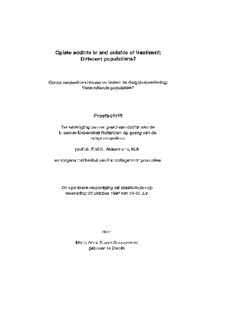
Opiate addicts in and outside of treatment PDF
Preview Opiate addicts in and outside of treatment
Opiate addicts in and outside of treatment; Different populations? Opiaal verslaafden binnen en builen de drugshulpverlening: Verschillende populaties? Proefschrlft Ter verkrijging van de graad van doclor aan de Erasmus Universiteit Rotterdam op gezag van de rector magnificus prof.dr. P.W.C. Akkermans, M.A. en volgens hel beslui! van he! college voor promoties De open bare verdediging zal plaalsvinden op woensdag 22 oklober 1997 om 13.45 uur. door Maria Anne Eland-Goossensen geboren Ie Zwolle ISBN 90-74234-9-4 No part of this book may be reproduced in any form or by any means without permission of the author. © M.A. Eland-Goossensen September 1997 DWM drukkerij Westeinde 2, 3146 BZ Maassluis Tel: 0 I 0-591 0033 Promotle commlssle Promotoren: Prof.dr. H.F.L. Garretsen Prof.dr. W.J. Schudel . Mw. dr. L.A.M. van de Goor Overige led en: Prof.dr. P.J. van der Maas Prof.dr. J. Passchier Dr. G.M. Schippers I I I I I I I I Voor mijn overleden oma's Maria Jansen en Adriaantje Monster. Zij zouden ook 9(8ag verder hebben ge/eerd, maar zij hadden de tijdgeest legen zioh. Contents 1. General Introduction 9 2. Study design, methods and materials 11 2.1 Opiate addicts in and outside of treatment: A combination of clinical and 12 field research 2.2 Heroin users without treatment 22 2.3 Snowball sampling applied among opiate addicts outside of the treatment 32 system 2.4 Supplement 45 3. Problems with drug use and problems In other life areas 47 3.1 Profiles of heroin addicts in different treatment conditions and outside of 49 treatment 3.2 Heroin addicts in and outside of treatment compared at severity of problems 64 and need for help 3.3 Drug use career and treatment history of opiate addicts in and outside 78 of treatment 4. Comorbld psychopathology 89 4.1 Opiate addicts in and outside of treatment compared on psychopathology 90 4.2 Drug use career and psychiatric history of opiate addicts with no, 105 moderate or severe psychiatric history 4.3 Screening for psychopathology in the clinical practice 119 5. Processes of addiction and help-seeking behaviour 129 5.1 Heroin addiction careers: downward spiral or controlled descent? 130 5.2 Factors that influence help-seeking behaviour of opiate addicts 143 5.3 Methadone supply in The Hague: clients'views 153 6. General conclusions and discussion 163 7. Summary 169 8. Samenvattlng 173 Dankwoord 177 Curriculum Vitae 179 Section J 1. General Introduction The core of this study is related to the insight that the population of opiate addicls is quite an invisible group. Some paris of this group can be identified at treatment institutions and in prisons. However, a large pari of the opiate addicls is hard to detect. This is because their illegal activities are often hidden and because many of them move frequently from one place to another. Although some are easy to spot at public places, these are very hard to approach for research. For years stUdies have been performed in the different echelons. Researchers studied criminal behavior of addicts in prison. Others analysed factors that influenced treatment success of addicts in drug treatment settings. Again others described the life of the drug using subculture by participant observation. Each data set was used to answer the specific research questions and that was it. This study is a first step to a more holistic approach. Separated pieces of information do not satisfy anymore. What is needed is comparable information gained in all known subgroups of the population. Only in that way the most complete view on opiate addiction can be reached. The next step is to repeat these measurements in the different subgroups regularly. In that way a consequent monitoring of the population will become possible, of which policy makers, clinicians and researchers will benefit. In this thesis characteristics of opiate addicts who apply for a methadone programme, a clinical detoxification programme, a drug free therapeutic community and opiate addicts outside of treatment are described. A comparison is made of the nature, severity and extent of drug use and the accompanying medical, legal, employment, social and mental complex of problems. On the basis of this comparison the following questions will be discussed: Which factors are linked with the decision of opiate addicts to seek professional help? and Which factors are linked with the choice for a specific type of treatment? The study design and the results are presented in four sections, which are structured according to the central research questions they provide answers for. Each section contains three chapters. Section two describes the outline of the study and the methods used in detail. Section three presents problems with drug use and accompanying problems. Section four focuses on comorbid psychopathology (dual diagnosis). In section five processes of addiction and help-seeking behaviour are discussed. The final section six contains the conclusions, general discussion and a summary. 9 Study design, methods and materials 10
Description: